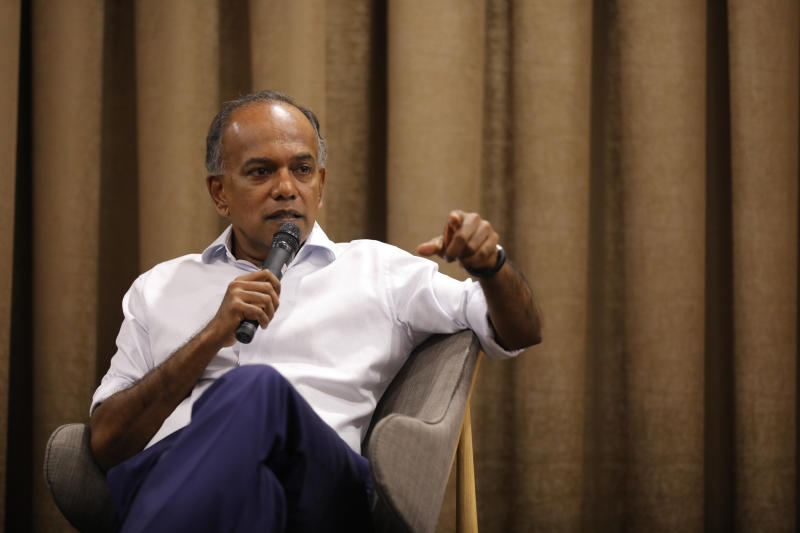Proposed fake news law: Shanmugam pledges 'fast and relatively inexpensive' court appeals process
Sign up now: Get ST's newsletters delivered to your inbox

Law and Home Affairs Minister K. Shanmugam said the Government is trying to reduce the cost of such appeals "very substantially" and allow individuals to act without employing a lawyer.
ST PHOTO: ONG WEE JIN
Follow topic:
SINGAPORE - It will be "fast and relatively inexpensive" to challenge decisions taken by the Government to act against online falsehoods under a proposed law, said Law and Home Affairs Minister K. Shanmugam on Tuesday (April 9).
Mr Shanmugam said the Government is trying to reduce the cost of such appeals "very substantially" and allow individuals to act without employing a lawyer.
"Of course, people can employ lawyers," he said in response to a question asked at an event organised by the Association of Muslim Lawyers and social enterprise Wise SG. "But we want to make the process such that you fill in a form that sets out your position, and we want to try and make it fast and relatively inexpensive."
The proposed Protection from Online Falsehoods and Manipulation Act allows for people to appeal to the courts if they disagree with a government decision taken to correct a falsehood. But some have pointed out that this could be a costly means of seeking redress.
On Sunday, Deputy Speaker of Parliament Charles Chong called on the Government to make the appeals process "less onerous". This would give people the assurance that there are adequate avenues of redress when there is disagreement with the Government's decision, said Mr Chong, who chaired the Select Committee on Deliberate Online Falsehoods last year.
Under the draft law, ministers are given powers to order corrections or removals of online falsehoods, and also ask for sites spreading such falsehoods to be blocked, if they harm the public interest.
If applications to the ministers to vary or cancel the orders are rejected, people can turn to the courts, which will be the final arbiter.
Singapore Management University law don Eugene Tan asked during a small group session involving around 20 lawyers and academics, whether the Government could include illustrations relating to the definition of a falsehood, which would help to clarify the intention of the Bill.
"We certainly can consider inserting some illustrations into the legislation," Mr Shanmugam replied.
The event, to discuss hate speech and deliberate online falsehoods, included a larger dialogue, attended by about 160 academics, businessmen, students and religious leaders.
Institute of Policy Studies senior research fellow Carol Soon asked the minister how the Government would handle sensitive information involving national security in order to correct a falsehood.
Mr Shanmugam acknowledged that in such circumstances, a simple statement saying that an article in question contains a falsehood "is not going to cut much ice".
If the ministry involved decides to respond, it will have to make a "judgment call" on how much information to put out, he said.
"It must be clear enough so that when people read it, they will say this is obviously true," he said. "If you don't set out enough, then you probably revalidate the original falsehood."

